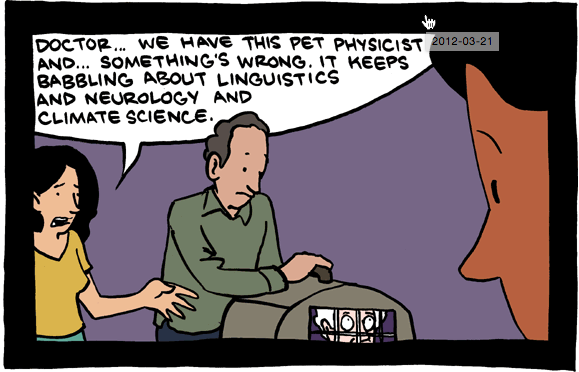March 28, 2012 @ 4:16 am
· Filed by Mark Liberman under Language and culture, Language and the media
Recently, a disagreement about the syntactic analysis of certain aspects of an obscure language has achieved an unusual degree of public interest: Tom Bartlett, "Angry words", The Chronicle of Higher Education, 3/20/2012; Jenny Schuessler, "How do you say 'disagreement' in Pirahã?", NYT, 3/21/2012; etc. Of course, as those articles explain, this is all part of a broader controversy about the nature of language, whose latest round was kicked off by the publication of Dan Everett's new book, Language: The Cultural Tool.
Geoff Pullum's latest Lingua Franca column, "The Rise and Fall of a Venomous Dispute", puts this dispute into historical and intellectual perspective. If what you've learned of the squabble's linguistic, philosophical, or political aspects interests you at all, Geoff's essay is the thing to read. In case you want more, I've collected a list of links below.
Read the rest of this entry »
Permalink
March 27, 2012 @ 11:38 pm
· Filed by Victor Mair under Books, Etymology, Language and culture, Language and politics, Names, Writing
From California, Julie Wei sends me "tidbits: curious words":
Read the rest of this entry »
Permalink
March 27, 2012 @ 8:22 am
· Filed by Mark Liberman under Language and culture

An interesting Op-Ed in the NYT today by Kitty Burns Florey — "A Picture of Language", about the history of sentence diagramming:
The curious art of diagramming sentences was invented 165 years ago by S.W. Clark, a schoolmaster in Homer, N.Y. His book, published in 1847, was called “A Practical Grammar: In which Words, Phrases, and Sentences Are Classified According to Their Offices and Their Various Relations to One Another.” His goal was to simplify the teaching of English grammar. It was more than 300 pages long, contained information on such things as unipersonal verbs and “rhetorico-grammatical figures,” and provided a long section on Prosody, which he defined as “that part of the Science of Language which treats of utterance.”
Read the rest of this entry »
Permalink
March 27, 2012 @ 6:40 am
· Filed by Mark Liberman under Crash blossoms
"Chinese cooking fat heads for Holland", DutchNews.nl 3/27/2012.
Read the rest of this entry »
Permalink
March 26, 2012 @ 9:33 am
· Filed by Mark Liberman under Language and gender
Brett Reynolds writes:
Over on English Language & Usage, the following question appeared:
Many Japanese textbooks of English mention the "feminine 'so'": the use of "so" for "very" is more typical of a feminine speaker. I don't think this is true in the US (I learned English living in Southern California and have now lived in the US for 10 years), but is it at all true in the UK? In other parts of the world?
I don't have access to a male/female tagged corpus. Would you be interested in following this up?
I don't have time this morning for a very elaborate investigation, but a small (one cup of coffee) Breakfast Experiment™ suggests that the use of so as an intensifier is indeed (statistically, not categorically) sex-associated.
Read the rest of this entry »
Permalink
March 26, 2012 @ 6:02 am
· Filed by Geoffrey K. Pullum under Language and advertising, Language change, Syntax
On a billboard advertising an investment firm is a photo of a young-middle-aged guy described by Caroline Sams (on Twitter, 6 Nov 2012) as a "smug George Clooney look-alike" she'd like to punch. The slogan below his handsome twinkly-eyed unpunched face says:
I ask my team for 100%. If they give me more is OK too.
Another Twitter user asked if that second sentence isn't missing some commas or some extra words or something. But I think not. I think we have an incipient new construction here. I think this is an if-phrase used as subject of a clause in a way that isn't quite the same as anything I've seen before (I could be wrong). The semantic interpretation of if they give me more here has to be something like "for them to give me more".
Read the rest of this entry »
Permalink
March 25, 2012 @ 3:11 pm
· Filed by Geoffrey K. Pullum under Language and culture, Syntax, Taboo vocabulary
Indiana's News Center reports that a student, Austin Carroll, has been expelled from Garrett High School for posting this tweet on his own Twitter account:
Fuck is one of those fucking words you can fucking put anywhere in a fucking sentence and it still fucking makes sense.
The school says he posted from a school computer; he says he did it from home and it's none of their business.
What saddens me is that Austin was making a linguistic observation, and it's basically almost true. This may be a budding linguist, and he's been kicked out of his high school for a syntactic observation.
Read the rest of this entry »
Permalink
March 24, 2012 @ 6:28 am
· Filed by Geoffrey K. Pullum under Errors, Language teaching and learning
As I read the Daily Mail article referred to in my previous post, my eye drifted down into the comments, and I saw that a commenter in London signing himself as JustSomeBloke had said this:
Time and time again, it has been shown that the school's league tables are routinely fiddled in order to benefit this or that school. At the same time, our so-called education system — ruined by lefty, progressive teaching methods — can barely teach our children to write English properly. If your a younger reader, you probably didn't even notice the two deliberate mistakes in this comment.
Well, I am not a younger reader; I have 40 years of involvement in academic work on the English language. But I have to confess to you that it took a couple of readings before I spotted both errors. The second was immediately noticeable, but I had to go back and look again to identify the first, which I had casually read past.
Read the rest of this entry »
Permalink
March 24, 2012 @ 4:06 am
· Filed by Geoffrey K. Pullum under Language acquisition, Language teaching and learning, Languages
High school principals in the UK are discovering that immigrants can be a very useful resource for them. Schools are rated according to the number of passes their students obtain in the General Certificate of Secondary Education (GCSE). There are 619,000 immigrants from Poland now living in the country, and Polish is available as a GCSE examination subject.
Polish is now the 5th most popular language to take at GCSE level. And 95% of those taking it gain one of the top 3 of the 9 grades (a much higher percentage than for languages like French or Spanish). Moreover, 97% of those who take Polish score worse on the English Language exam. The inference to draw is clear, and very probably true: schools are pushing Polish native speakers to take the exam, because it pushes up the school's GCSE rating.
Read the rest of this entry »
Permalink
March 23, 2012 @ 10:56 am
· Filed by Geoffrey K. Pullum under Eggcorns, Errors
A beautiful eggcorn spotted in the wild: parrot phrasing for "paraphrasing". I love it. I think I'm going to adapt it for making reference to particularly ignorant paraphrase that displays a birdbrained level of literacy.
Read the rest of this entry »
Permalink
March 23, 2012 @ 5:00 am
· Filed by Geoffrey K. Pullum under Animal behavior, Changing times, Ethics, Humor, Language and the law, Language and the media, Silliness
The Daily Mail has this terse and unpunctuated notice below one of its stories today:
Sorry we are unable to accept comments for legal reasons.
Why this departure from the open comments policy that is the right of every online reader of anything in the 21st century?
Read the rest of this entry »
Permalink
March 22, 2012 @ 12:16 pm
· Filed by Mark Liberman under Linguistics in the comics
In the most recent Between Failures, an nice example of a non-restrictive relative clause (or a supplementary relative clause, as Geoff Pullum would prefer) introduced by that rather than which:

Permalink
March 21, 2012 @ 9:57 am
· Filed by Mark Liberman under Linguistics in the comics
From the most recent SMBC — the symptoms:

Read the rest of this entry »
Permalink


